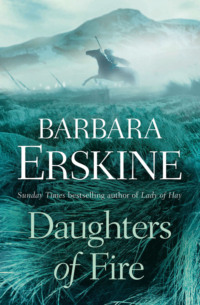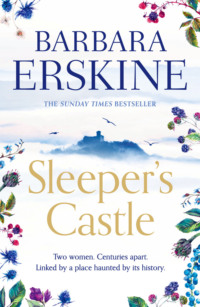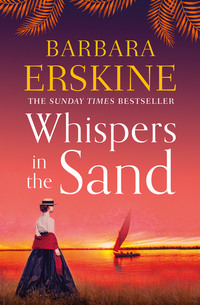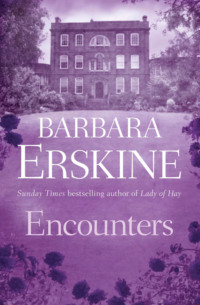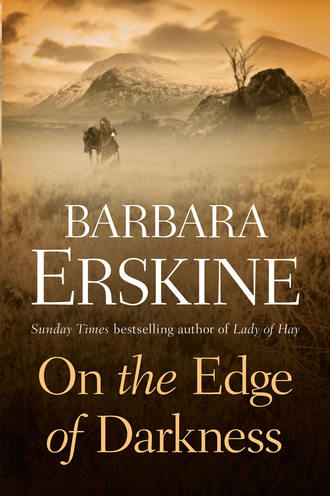
Полная версия
On the Edge of Darkness
He was taken by surprise. ‘But it’s hours until dark. Do you have to go?’
It was no use. She shrugged and turning, with a little wave, she dodged behind the stone slab and out of his sight.
He leaped to his feet. ‘Brid, wait. When shall I see you? When shall I come again?’
There was no answer. He ran a few steps after her and stopped in confusion. There was no sign of her. He retraced his steps to the spot where he had been standing and then turning, followed in her exact tracks. The afternoon seemed to have grown misty again. He stood, his hand on the stone, and peered ahead and suddenly there she was, running down the hillside in the thin sunshine. He set off after her, not shouting this time, deliberately following her at a distance and consciously noticing the way they were going.
She was following a clear track which he did not remember seeing before. He frowned, looking at the wood below him on his right. That was where the Scots pine should be. There were Scots pine, but too many – many many more than he remembered, unless they had already slipped unnoticed into a different valley. That was perfectly possible. One often did not see ridges and glens in the hills until one was upon them. He realised she was fast disappearing from sight and he plunged after her, aware of the strong smell of the heather and the baking earth and rock. Overhead a buzzard was calling, the wild yelping miaou growing fainter as it spiralled higher and higher until it was nothing but a speck in the blue.
The first he noticed of the village was the thin spiral of white smoke, almost invisible against the sky. He slowed down, trying to get his breath back, more cautious now. Brid was skipping unselfconsciously about a hundred yards ahead of him as he ducked behind some low whin bushes. She stopped and seemed to be gathering some flowers, then she moved on, holding them in her hand, more decorous now. He saw her surreptitiously rub some dust from her skirt and run her fingers through her hair.
He hesitated for a moment, then he ducked out of his hiding place and ran a few paces further on, to throw himself full length behind a small outcrop of rock. From there he peered at her again. Two figures had appeared on the dusty track and he could now see the village more clearly. It consisted of little more than a cluster of small round houses situated around a larger, central one. He squinted to see the figures better and recognised the taller of the two as Gartnait. The young man stopped when he saw Brid and waited for her. From the way he stood, the flailing of his arms and Brid’s sudden, obvious dejection, it was clear that Gartnait was angry.
Adam, who had been about to leap to his feet and admit to his presence, changed his mind abruptly. He lay where he was, his chin propped on his hands, watching. His vantage point allowed him to see the three figures – the third unknown to him – walk slowly back towards the village. Once there they stood and talked again animatedly for several minutes before at last ducking into a low doorway in one of the houses and disappearing from sight.
He stayed there for a long time, hoping someone would reappear. When it was clear they weren’t going to, he began to crawl slowly forward, taking advantage of the clumps of long dried grasses as the only reasonable cover to hide him. Once he heard a dog bark. He dropped flat, pressing his nose into the dry earth, smelling its hot peppery sweetness. After a few moments the barking stopped, abruptly silenced by a curt command, in what language he could not tell.
He waited, holding his breath. There was no further sound and he raised his head again to find himself looking at a pair of soft leather sandals. Leaping to his feet in fright he found himself half suspended by the collar, face to face with a tall, white-haired man with fierce dark eyes, a fine aquiline face and a narrow mouth set in a tight-lipped scowl. The man barked a question at him and Adam wriggled desperately, half angry and half afraid.
‘Let me go! I’m not doing any harm! Let me go! I’m a friend of Brid’s.’ He flailed out uselessly with his fists and the man put him down, transferring his iron grip to Adam’s wrist. Turning he strode towards the village, pulling Adam with him. The boy wriggled harder, his initial alarm turning to real fear. The look in the man’s eyes had been uncompromising and Adam knew that look well.
As they walked down the dirt track which served for a village street Adam saw faces at the doors. One by one the inhabitants appeared. Dark, shaggy-haired, dressed in strange bright-coloured woollen or leather breeches, the men were staring at him aggressively. Behind them he could see the women, most of them swathed in shawls, half hidden in the dark depths of the cottages, and suddenly he knew who they were. This must be a camp of tinkers – or real Romanies perhaps – from far away. He had seen tinkers, of course, in the village at home. Two or three times a year some of them would come, camping on the riverbank; they would mend the pots and pans of the housewives, and sharpen their knives, and then when the factor decided too many salmon had disappeared from the river they would move on overnight with their colourful vans and their ponies. He had heard that they had settlements somewhere over the hills where they went in the wintertime and this must be one of them. The realisation comforted him. Somewhere at the back of his mind had lurked a niggling fear about where Brid came from – a shiver, no more – something he couldn’t put a name to. To find out that she was a gypsy was a reassurance. The tinkers were always friendly. They got on well with the village children at home and the folk all got on well with them. Except for the factor of course, and the ghillies.
He stared round, trying to see Brid and Gartnait, and finally spotted them at the back of the crowd. He felt a surge of relief. ‘Brid!’ he cried. ‘Make him let me go!’ He wriggled, tried to bite the hand holding him and received a cuff on the ear for his pains. The tall man had followed his gaze and was also staring at Brid. He pointed at her and shouted a command. The men and women around her fell back. Brid looked terrified. Slowly she moved forward through the silent, staring crowd and came to stand in front of them.
‘Brid, tell him! Tell him I’m your friend,’ Adam begged. The man’s grip on his arm had not slackened. His head, Adam had noticed for the first time, was half shaven and there were dark tattoos on his forehead beneath the wild white rim of hair.
Brid shook her head. Covering her face with her hands she fell on her knees. Adam could see tears trickling from between her fingers. ‘Brid?’ He had stopped struggling, shocked by her abject terror.
It was Gartnait who stepped up behind her. He rested his hands gently on his sister’s shoulders and spoke to the tall man, his voice calm and clear.
Adam glanced from one to the other. Both men, he noticed, were wearing silver bracelets on their arms. Gartnait had a sort of necklet around his throat and beneath his cloak the short sleeves of his tunic showed that he too had intricately coloured tattoos on his arms and an intricately wrought golden band above his elbow. It made him look exotic and foreign. Very glamorous. Adam found his eyes going from one man to the other. His father disapproved of jewellery. He thought it an abomination, as he thought so many things were which were clearly nice or fun or beautiful. His mother owned none save her wedding ring. He had never seen a man wear jewellery save for the tinkers in the village who sometimes wore earrings, and Lord Pittenross who owned the estate and wore a gold signet ring with a carved crest on the little finger of his left hand. Adam, in spite of his fear, was impressed.
The tall man’s grip had slackened slightly as he stood listening to Gartnait and Adam snatched his arm away. He rubbed it defiantly, squaring his shoulders, feeling braver now. He gave Brid a quick grin but she was still kneeling with her hands over her eyes.
It was the turn of the tall man to speak now. He gestured at Adam, sweeping the boy with a withering look which took in his open-necked shirt, his shorts, his bare brown legs and his dusty sandals. It was then that the man pulled out a knife.
Adam gasped. Nearby, one of the watching women groaned. Gartnait went on talking calmly as though nothing had happened, but his fingers on his sister’s thin shoulders had tightened until the knuckles went white.
Brid took her hands away from her eyes. Her face was very pale. ‘Run, A-dam!’ she cried suddenly. ‘RUN!’
Adam ran.
He turned like an eel beneath the man’s flailing hand and diving through the crowd fled as fast as he could back the way he had come. His sudden movement had taken them all by surprise and it was a moment before the tall man started in pursuit. But he gave up almost at once. No one else had moved.
Adam did not wait to see what happened. He pounded up the track, jumping over stones and heather, leaping from rock to rock across the burn and slithering down a gully which took him out of sight of the village. At the bottom he lay still, gasping for breath. His heart was hammering somewhere in his throat and his legs were trembling with exhaustion and shock.
When at last he raised his head and looked around he half expected to see the tall man there again standing over him. There was no one there. The gully was deserted. Nearby he could hear a stonechat calling, its metallic voice an eerie echo of the sound of Gartnait’s hammer, and the distant slithering cascade of scree in the wake of his passing. Nothing else. He raised himself up and peered round carefully before climbing slowly up to the top of the rocks and looking behind him. There was no sign of the village. It was out of sight behind the shoulder of the hill and the heather and rocks were empty of any signs of pursuit. And of any landmarks he recognised.
He knew that to find his way home he needed to go south-east. He glanced at the sun, though he knew already which way he should go from the lie of the distant hills.
Not until the sun had set behind the shoulder of Ben Dearg did he admit at last that he was lost. He could feel the fear crawling in the pit of his stomach. The hillside looked familiar, but he could not see the stone. He could see no sign of anything he recognised. Feeling for footholds as silently as he could amongst the blaeberries and sliding scree he crept up to the rim of the gully and peered over the edge. The outline of the distant hills was the same as always, as were the contours of the glen below, but he could not see the cross-slab. In the distance he noticed suddenly the curl of smoke against the sky that showed the location of Brid’s village and he calmed himself down with an effort. After all, he had been exploring these hills with his friends since he was old enough to slip away from the village. What would his heroes do in these circumstances? Men like Richard Hannay or Sexton Blake, Alan Breck or the Scarlet Pimpernel? He didn’t have a compass but he would use his watch with the sun. With new determination he set off in what he hoped was the right direction, his back resolutely to Brid’s village, hoping that whatever was happening there she would not get into any further trouble because of him.
Wraiths of mist were curling through the trees when he at last found the stone cross again. It was the copy, the one that Gartnait was working on. He rested his hand on it, touching the sharp-edged carving of the looping intricate designs with his fingertips. Gartnait had stopped halfway through incising a broken spear. He could feel the shallow punch-marks outlining the design.
In the east, the deep amethyst dusk was beginning to hover over the valley. It hid the distances from sight, wrapping the whole area in darkness.
He stepped away from the stone, looking round for the older original, the landmark which had stood on the hill for fourteen hundred years. There was no sign of it. The air was very still.
Frowning, he moved a few paces forward, overwhelmed suddenly by a strange dizziness. His head was spinning. He had been running too fast. He stumbled, shaking his head from side to side, trying to rid himself of the slight buzzing in his ears. Then the moment had passed and his head cleared. Below him the mistiness had drifted away and in the distance he could see the grey stone roofs of the forge and the post office, the lights from the main street, and the shoulder of hillside above the waterfalls which hid the manse from his view, while behind him the old cross caught a last shaft of slanting light from the sun as it slid over the horizon.
3

‘A-dam?’ The hand on his shoulder was as light as thistledown. He started and sat up. ‘Brid?’
It was the spring. The Easter vacation. Ten whole days of freedom stretched before him. Adam had come back several times in the autumn but there had been no sign of Brid or Gartnait, no trace, though he cautiously searched, of the shabby cottage or the village. Frustrated, he pored over maps and books in the library for signs of the place, but to no avail, and when the snows came to the mountains he gave up looking and concentrated, much to his father’s satisfaction, on his school books.
He had also given up hoping for a message from his mother. He no longer raced to meet the postie or hid on the stairs peering through the banisters, his heart thudding with hope when there was a knock on the door.
Sometimes, at night, he cried for her, secretly, his head under the pillow to drown his stifled sobs. His father never mentioned her and he did not dare ask. He was not to know that there had been letters; four of them. Enclosed in the missives she sent to her husband, pleading for forgiveness and understanding, the lonely, frightened, desperate woman’s declarations of love for her son went unread into the waste paper basket and slowly, miles away to the south, her despair of ever seeing Adam again grew greater. Once she had come on the bus and stood, hidden by a hedge, hoping to catch a glimpse of him, but her fear of being spotted by someone from the village, or worse still by her husband had been too great, and, in tears, she had caught the next bus back to Perth and then the train south. She did not know that that day Adam had been far away on the hillside, lost in dreams.
Jeannie Barron knew no more than Adam did. Her heart ached for the boy as she saw his white face and the tell-tale red-rimmed eyes in the mornings. When school started he would cycle off while it was still dark to the bus stop in Dunkeld five miles away and there he would catch the bus to Perth, leaving his bicycle hidden behind a hedge. When he returned from the long day, his books in his satchel, it would be dark once again and there was no question of going anywhere but, after supper, to his own room. When the snows came he would stay in Perth during the week, lodging with Jeannie Barron’s cousin Ella as he had done since he first went to the Academy.
‘Brid!’ He grinned with pleasure. ‘I thought I wouldn’t see you again!’ He had been terrified for her after he had fled from her village, his memory of the tall, angry man and the gleaming knife-blade haunting his worse nightmares.
‘A-dam, shortbread?’ She sat down beside him and, reaching for his knapsack, rummaged through it hopefully. It contained his bird book and field glasses, the notebook and an apple.
He shrugged. ‘No shortbread. Sorry.’
‘No shortbread. Sorry,’ she repeated.
‘Have the apple.’ He picked it out and handed it to her.
She looked at it doubtfully.
‘Surely you know an apple!’ He shook his head in despair and taking it back from her took a huge bite to demonstrate.
She laughed and nodded and taking it back from him followed suit, displaying her small white teeth. Like him she had grown taller in the intervening months.
‘Apple good.’ She nodded.
‘Brid, why was that man so angry when I came to your village? Who was he?’ He was trying to mime the question.
She looked at him and for a moment he thought she understood. The quick intelligence in her eyes, the sudden tension of her shoulders betrayed her, but she shook her head and smiled. ‘Apple good,’ she repeated.
Frustrated, he shrugged. Then he had an idea. ‘I’m going to teach you some more English,’ he announced suddenly. ‘Then we can talk properly.’
His lessons went on all through the summer. Adam, his knapsack laden with shortbread, or scones or chocolate cake – immediately popular with Brid – met her on the long evenings and at weekends and then in the vacation. Most of the time they stayed on the southern slopes of the hillside, making no attempt to go to her village. He had pushed Brid on the subject of the man’s identity, but she had changed the subject with a shrug. One thing was clear however: whoever he was, she was very afraid of him. A couple of times they visited the cottage where her mother lived, just for the summer, he discovered, so Gartnait could be near the carving, for carving the slab seemed to be his full-time occupation. In the winter it appeared he had a workshop and men to help him but there was something special about this carving, something special about this stone, so that he had to work on it in situ. Sometimes they would sit and watch him for hours and he too would join in the language lessons while he worked, his chisels, hammers, punches and polishing stones laid out neatly in a row beside him.
Brid was a very fast learner and talkative and it was not long before she had overcome the frustrations of not being able to communicate with her companion. Adam for his part had already found out from his lamentable marks in Latin and French at school that languages were not amongst his strengths. His tongue tied itself in knots around the words she tried to teach him and he could remember few of them though he loved the way she laughed till she cried when he tried. Her fluency though made it easy for her to avoid his questions when she wanted to, and eventually he gave up asking about her village and her people. Gypsies, he supposed, must be naturally secretive, and with that conclusion he had to be content.
Jeannie Barron, discovering that chocolate cake was one of the ways to make Adam happy, made them more often and the two young people grew brown together in the sun as they picnicked and paddled in the burns through the hot spell. Adam made no effort to see the boys who had once been his friends. He no longer knew or cared if they avoided him. He seldom saw his father, who himself stayed out late more often. If he had known that Thomas was spending more and more time in agonised prayer, locked alone in the kirk, he might have felt a glimmer of sympathy, he might have sensed his father’s turmoil and loneliness and confusion, but he did not allow himself to think about his father at all. There were only three adults now in his life whom he trusted: Donald Ferguson, one of his science masters at school, Jeannie Barron, and Brid’s mother, Gemma.
‘A-dam, today we go see eagles.’ Brid adored his bird book. She pored over the pages and told him the names of many of the birds in her own tongue – names he could never remember. To his surprise she couldn’t write, so he had added that skill to his lessons, reassuring her when she fumbled with pencils, praising her when they found to the surprise of both of them that she could draw.
The eagles had an eyrie high on the side of Ben Dearg. To reach it they had to walk for a couple of hours, scrambling over increasingly steep rock and heather before stopping and sliding down the first of the deep corries that ran from east to west across the high moor. Halfway along, near the foot of the rockface, a torrent of brown burn water cascaded over a cliff some twenty feet or so into a circular pool before racing on down the mountainside. As they came to the edge of the cliff, several deer looked up startled and stared at them for a moment before bounding away out of sight.
Adam smiled at her. She was wearing as she always did a simple tunic, this one dyed in soft blues and greens, tied at the waist with a leather girdle in which she wore a serviceable knife. On her feet she wore sandals, not buckled like his but fastened round the ankles with long ribbon-like thongs. Her long hair she had fastened back with a silver clip. ‘We gave them a fright.’
She nodded. She had reached the pool first and she stopped and waited for him. Adam fell to his knees and bent over the water, splashing it over his hot face. ‘We could swim here.’ He grinned at her. ‘It’s deep. Look.’
She looked at him doubtfully and then at the dark water. ‘Swimming not allowed here.’
‘Why not? You paddle in the burn. It’s not that deep. I’ll show you.’
Before she could stop him he had pulled his shirt over his head and kicked off his shorts. Dressed only in his underpants, he leaped into the brown water.
It was much deeper than he expected and ice cold. He swam a few strokes under water, reached the vertical rock wall on the far side, ducked into a turn and rose to the surface gasping.
‘A-dam!’ Brid was kneeling on the rock at the edge of the pool. She was looking furious now. She held out her hands to him. ‘Come out. You must not swim.’
‘Why not?’ He shook his wet hair out of his eyes and struck out across the pool towards her. He was there in four strokes. ‘Hey, what’s wrong?’
She was pulling at his arm. ‘Get out! Get out! Get out quickly!’ She stamped her foot.
‘What is it, Brid? What’s wrong?’ He levered himself out beside her. ‘You’re not afraid, surely?’
‘A-dam! The lady in the pool. You have not paid her!’ Brid was whispering angrily.
‘The lady?’ He stared at her. ‘What are you talking about?’
‘The lady. She lives in the pool. She looks after it.’
Adam looked puzzled for a moment, then light dawned. ‘Like the cailleach, you mean? The old witch. A spirit. Brid! You don’t believe that? That’s wicked. That’s against the Bible.’ He was shocked.
She shook her head, not understanding him. Going to the knapsack which was lying on the ground in the shade of a rock, she rummaged in it until she found the greaseproof-wrapped cake. Opening the paper she drew her knife and carefully cut the wedge of cake into three. ‘For A-dam. For Brid. And for the Lady.’ She pointed to each slice in turn. Picking up the third piece she walked with it to the edge of the pool and climbed carefully out onto the rocks, which were slippery with spray, until she was as close as possible to the waterfall. Crumbling the cake between her fingers, slowly she dropped it piece by piece beneath the cascade, chanting some words under her breath as she did so.
When she had finished she stood still for a moment, staring round anxiously as though waiting to see if her offering had been accepted.
‘Brid!’ Adam was appalled.
She silenced him with an abrupt gesture, still scanning the water, then she pointed. He saw a small shadow flash past and it was gone.
‘That was a trout,’ he said indignantly.
She shook her head. Then in another lightning change of mood she clapped her hands and laughed. ‘Trout messenger of the Lady!’ she cried. She skipped back onto the bank. ‘The Lady is pleased. Now we swim.’ She sat down and began to unlace her sandals.
Beneath her tunic Brid was naked. She stood for a second on the rock, her body a pale contrast to her tanned arms and legs, then she leaped into the water with a splash and a delighted shriek.
Adam stood still. He caught his breath. He had seen the baby sisters of his friends sometimes without their clothes when their mothers bathed them before the fire, and he had always averted his eyes, particularly avoiding looking at the shockingly naked slit between their legs. He was still seriously intending to be a doctor, but he had never seen an older girl or a woman without clothes before, and now he had seen for a short moment when she stood untroubled on the rock this slim girl, young woman; seen her small firm breasts, the dark fuzz of hair between her legs, the provocative curve of hip and buttock before she leaped into the water.


